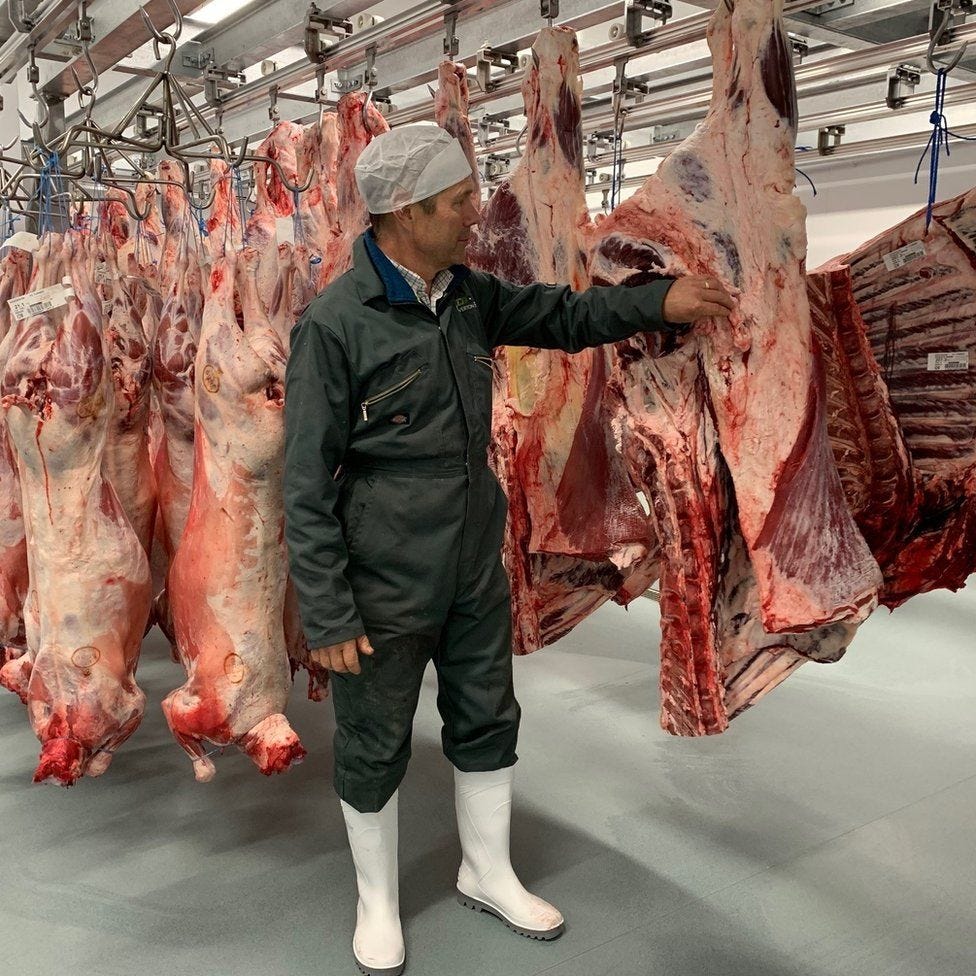Small British abattoirs are closing at a rate of 10% a year
The dramatic decline in small abattoirs is reducing our control of the food supply
A couple of years ago, when I was doing my normal Saturday food shop at the Balham Farmers Market, I remember having a very intriguing conversation with the butcher there.
I had been asking him for weeks if he had any beef liver in stock (which is not typically available in British supermarkets), to which he almost always replied ‘no’.
When I pushed him on why this was, he told me that his abattoir was struggling with a huge processing backlog.
Very strangely, he added that with some carcasses, even in the event that he could get them processed, he wasn’t allowed to keep the offal sometimes (he didn’t expand on this particular issue beyond some vague health and safety reference).
This is when I first started to notice a worrying trend emerging in the UK.
Through a blend of conversations with butchers, reading newspaper articles and sharing online messages with farmers, I had come to realise that there was a huge issue unfolding with meat processing in the UK, and it was getting worse by the week.
And big picture, the numbers are quite concerning.
According to the Sustainable Food Trust there are only 249 abattoirs left in the UK, down from 1,890 before we joined the EU. (Exploring the impact of the EU on British farming is outside the scope of this article, but it is safe to say that it hasn’t been particularly helpful in this regard).
What’s even more bizarre is that three Irish food businesses - ABP, Kepak and Dawn Dunbia - have been quietly buying up British abattoirs for years and now own around 70% of UK processing capacity. To be clear, the issue here is the cartelist nature of British meat processing competition, not that the companies happen to be Irish, although that is slightly odd.
It speaks to a very serious issue within the British food system; that of increasing centralisation and corporate control of our food supply.
A survey carried out by the National Craft Butchers and the Sustainable Food Trust showed that the loss of small abattoirs is happening at a rate of 10% per year. Indeed, only 49 small red meat abattoirs remain in England, Wales and Scotland and, if closures continue at the current rate, none will be operating by 2030.
The implications of this are as frightening as they are obvious. Not only will animal welfare be adversely affected by increased journey times to slaughter, it will also increase costs for farmers and reduce the quantity of products they are able to sell.
The farmer share of retail price, which has fallen from an historic norm of 55 per cent to 46 per cent this year, equates to just £250 on a typical carcass. This works out at around 71p per kilo. Now think about how much you pay per kilo at the supermarket. Mince, usually the cheapest form of beef, will normally sell for around £5 per kilo. There’s clearly something amiss here.
And sadly, these economic conditions have become unviable for many farms, with some being forced to cease trading as a result of ever decreasing margins.
One customer of Tottingworth abattoir in East Sussex, which closed last year, said: “Without a local abattoir a major part of our local livestock sales will disappear. In the South-East there are so few abattoirs left that losing any more would prevent sales and increase food miles.”
In fairness to the current government, there has been a £4m fund launched to try and save small abattoirs through capital investment in their facilities. But whether this will be enough to save the small number of abattoirs left remains to be seen.
Abattoirs are still failing to keep their head above water. McIntyre Meats, one of the last family-owned abattoirs in Yorkshire, has recently announced it will cease trading in April 2024 after more than 20 years of serving the local community. There have been various other cases like this in the past two years too, including Black Brow in Cumbria, Mettrick’s in Derbyshire and, most recently, Long Compton in the Cotswolds.
Centralised control of our food supply - specifically our meat supply - is something we all need to be wary of. It doesn’t take a historian to tell you what horrors usually await when a small number of conglomerates gain significant control over the food we eat.
But perhaps more important than this is the loss of tradition and heritage. These abattoirs are essential to small businesses, farm shops, local markets, butchers and pubs/restaurants, all of which are (and have been) integral to British culture. We must defend them at all costs.



